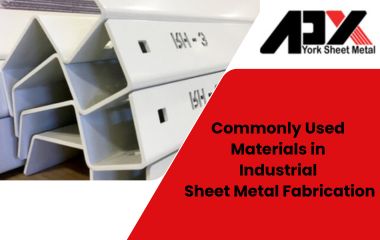Industrial sheet metal fabrication is a versatile and essential process that involves shaping, cutting, and manipulating sheet metal to create a wide range of products and components. The choice of materials plays a crucial role in determining the strength, durability, and performance of fabricated metal parts. In this blog post, we will explore some of the commonly used materials in industrial sheet metal fabrication, their unique properties, and the diverse applications they serve.
1. Steel: The Sturdy Workhorse
Steel is undoubtedly one of the most commonly used materials in industrial sheet metal fabrication. Its exceptional strength, durability, and versatility make it ideal for a wide range of applications. Whether it’s mild steel, stainless steel, or high-strength alloys, steel offers excellent resistance to corrosion, impact, and wear. Steel’s malleability allows for ease of fabrication and the creation of precise, complex designs, making it a go-to choice for structural components, machinery parts, and enclosures.
2. Aluminum: Lightweight and Corrosion-Resistant
Aluminum is another popular material in industrial sheet metal fabrication, known for its lightweight nature and excellent corrosion resistance. Its low density makes it ideal for applications where weight reduction is critical, such as aerospace components, automotive parts, and electronics enclosures. Aluminum’s natural oxide layer provides inherent protection against corrosion, making it suitable for outdoor applications. Additionally, aluminum offers good electrical and thermal conductivity, further expanding its utility across various industries.
3. Copper: The Conductor of Efficiency
Copper’s exceptional electrical and thermal conductivity make it a preferred choice for applications where efficiency and conductivity are paramount. Industrial sheet metal fabrication utilizes copper for the creation of electrical connectors, busbars, heat sinks, and intricate conductive components. Copper’s malleability allows for easy shaping and forming, enabling the production of intricate designs that facilitate optimized performance in electrical and thermal conductivity.
4. Galvanized Steel: Protection against Corrosion
Galvanized steel, a type of coated steel, offers an added layer of protection against corrosion. This material undergoes a galvanization process, where it is coated with a layer of zinc for increased durability and longevity. Galvanized steel exhibits excellent resistance to atmospheric corrosion, making it suitable for outdoor structures, roofing, and fencing. Its affordability and reliability make it a popular choice in industrial sheet metal fabrication for applications that demand corrosion resistance.
The materials used in industrial sheet metal fabrication form the backbone of its versatility and functionality. Steel, aluminum, copper, brass, and galvanized steel are just a few examples of the wide range of options available. Each material possesses unique properties that lend themselves to specific applications across various industries. Understanding the characteristics of these commonly used materials is crucial for manufacturers, allowing them to select the most suitable material for their specific needs and achieve optimal performance in their fabricated metal parts.
Choose APX York Sheet Metal
Are you searching for custom sheet metal fabricating? As your go-to custom sheet metal fabrication company in Central PA, APX York Sheet Metal is a family-owned business that provides quick turnarounds and excellent customer service. Our professionals take on massive projects and also support more intricate jobs. We handle our processes and shipments in-house and don’t outsource any part of the fabrication process.
Contact us today for more information!



